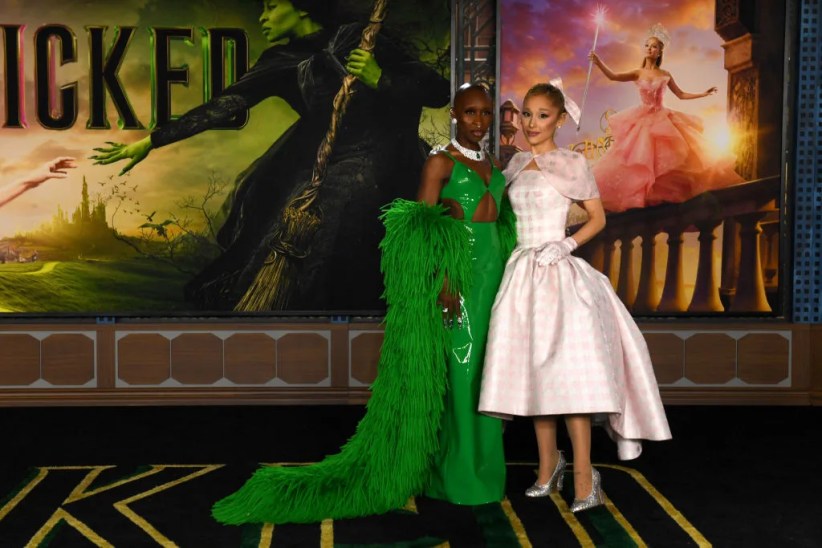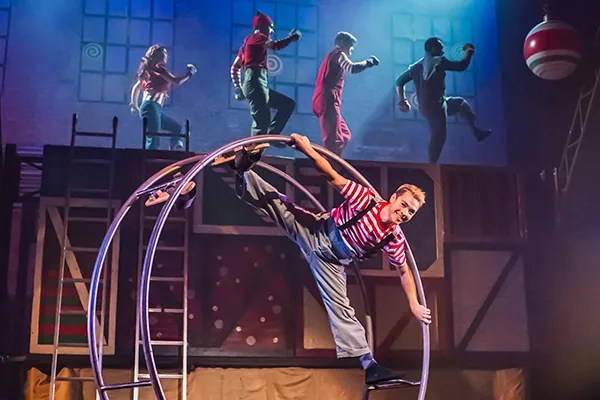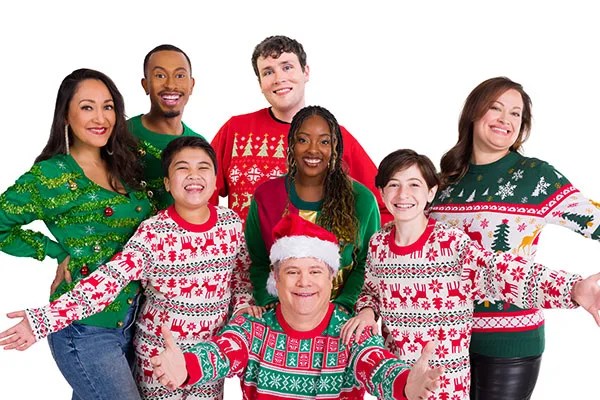Making it on Broadway is tough enough, but surviving there is equally hard — especially for kids, who have a selfish tendency to grow (and whose voices sometimes change) during the run of a show. Young performers must also suffer the frustration of supporting adult actors rather than starring themselves, with the added indignity of being overlooked for roles that are age-appropriate for them. Anyone who’s seen the original 1967 musical You’re a Good Man, Charlie Brown or its subsequent incarnations on Broadway and elsewhere will recall that the little folks from Peanuts were played by adults. Shows like Annie, where kids carry the action almost single-handedly, are relatively uncommon. So what do show kids do between shows? If they have the energy to tackle another round of highly competitive auditions, they’ll end up as one of The Broadway Kids. Not “a” Broadway kid, but one of The Broadway Kids. Numerically, The Broadway Kids currently consist of 29 young people ranging in age from about 8 to 14. That’s it for the numbers. In terms of ability, you have to think show titles: Les Miserables, Beauty and the Beast, The Music Man, Annie. And just keep going from there. Although their experience on the boards is undeniable, being one of The Broadway Kids gives these young performers something that many of the greatest shows can’t — experience working directly with one another. “Being with us is the only opportunity these kids have to perform with other kids,” says Bonnie Gallanter, general manager for The Broadway Kids Sing Broadway stage show and associate producer of the group’s recording unit. “They can work with each other, become friendly and hone their skills together — their singing, choreography, acting — while they’re between shows.” The group was founded, rather incongruously, by a person interested in eyes, not throats. Julius Shulman, an ophthalmologist with a New York-based private practice, created The Broadway Kids in 1994 when his 10-year-old son Michael was cast in the part of Gavroche in Les Miserables. Shulman discovered consciously what many Broadway musical theatergoers are only dimly aware of subconsciously: that albums of show tunes sung by young Broadway performers are Haley’s Comet-rare. Shulman rectified the situation immediately by forming a group consisting of his son and seven of his young colleagues, following that up by producing their first album, “The Broadway Kids Sing Broadway”. Since then, The Broadway Kids have been featured on five other CDs, including a Christmas CD and the recent, although atypical, compilation of pop tunes, “Hey! Mr. DJ!” “The Broadway Kids Sing Broadway” began life modestly as a CD, but has since evolved into its own stage show. The revue, which ran for about three years at the John Houseman Theater, included medleys from big-time crowd pleasers such as Oliver, Bye Bye Birdie, You’re a Good Man, Charlie Brown and Annie, making use of songs that were written for, and meant to be performed by, kids. (There is only one original composition in the bunch — The Broadway Kids’ theme song). According to Gallanter, the show, which ended its run about two years ago, is “in the works” for coming back this September. The Broadway Kids are actually made up of two factions — a recording unit and a live performing unit. The units, Gallanter points out, “do overlap quite a bit,” although only about six performers appear in any one show. The organization does not have its own theater, but in the 24 months since Sing Broadway was last heard at the Houseman, The Broadway Kids have been busy belting them out at various fundraisers, fairs, and festivals, not to mention tours. The touring, Gallanter says, does not occur on a long-term basis. “When we go out, it’s only for a few days or a weekend, not for weeks at a time,” she says. “And the kids are rotated.” Gallanter says that her young performers hail from all around the tri-state area, with some coming from as far south of the region as Philadelphia. Many are home-schooled, and all belie the Hollywood Boulevard image of on-screen cherubs with off-screen rap sheets. During their downtime, Gallanter observes, “they still stay pretty busy” by attending workshops, auditions, and rehearsals. When the dreaded period of voice changing occurs, or the kids simply become too old for their stage roles, many gravitate to film or television. “If they really have the bug, they’ll continue on in a workshop in New York, or they’ll go to L.A. at the end of January for the TV pilot season,” says Gallanter. (Alumni such as Greg Raposo and Christopher Trousdale later found fame with the teen group “Dream Street”; while Eden Riegel and Lacey Chabert found work in both television and feature films — Riegel lent her voice talent to Prince of Egypt, while Chabert appeared in Lost in Space). And where’s the son of the creator of The Broadway Kids these days, Michael Shulman? He ended up landing the title role in HBO’s Somebody Had To Be Funny. Gallanter understands and accepts the fluctuation in number within the ranks of The Broadway Kids. Hollywood — and voice changing — has always presented threats to Broadway’s youthful actors. But there’s never a dearth of new candidates; submissions from managers and agents — and parents with high hopes — come in regularly. “I probably get an email every day from people who want their kids to be Broadway Kids,” Gallanter claims. So if you’re thinking about sending Bonnie Gallanter an email about your own talented kid, remember this: they need to have Broadway on their resume, as well as in their blood. For more information, go to www.broadwaykids.com.





















